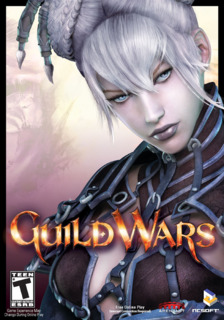Guild Wars is an incredible and impressive experience for your eyes and ears.
Guild Wars is far from your typical massively multiplayer online game. Rather than charge a subscription, or even content, the game’s online is 100% free with no strings attached. This would be expected of a game with poor production values trying to scrape up some sales with a gimmick online service, but this just isn’t the case. Guild Wars has great production values on top of a free online service that makes this game hard to not recommend.
While the story is pretty cliché and boring to an extent, it still sets up some pretty interesting battles. A horde of beasts threatens the survival of man in medieval times (no this isn’t another Lord of the Rings games). The beasts, named the “Charr” succeed in destroying the city of Ascalon. So basically the entire game revolves around trying to defeat the Charr and rebuild the city, but you quickly get distracted all over the place.
On your adventures you will get to experience a full 360 on environments. From the beautiful landscapes of Pre-Searing Ascalon to barren wastelands of Augury Rock, there is always something to look at that is utterly beautiful. These environments are richly detailed and utterly rewarding to explore. Not only are their riches tucked away, but also sometimes there will be a view farther into a canyon or something that will be magnificent to look at.
Guild Wars has a pretty unusual combat strategy system, one I haven’t found in any other online game. You are limited to 8 “skills” or combat attacks. You can swap these out at any time while in a town or outpost, but you can’t in battle, which introduces the strategy element of finding the best skills for an impending situation. This also sets up the group mechanic (as cliché as it might get, however.) of having a warrior, magician, healer, and an assortment of various minor professions. While this has been a staple of medieval clichés since as far back as I can remember, it is almost completely vital to have a group with those players in them.
One of the things that I really liked about Guild Wars that sets it apart from almost every massively multiplayer online role playing game is the fact that it gives your group a private copy of each area outside of a town when you leave a town or outpost. This means that you will never be crowded while playing or treasure running. It also means you cannot get any help from any other players though. This mechanic works very well I think, because all you have to do to find more players for the group is enter a town or outpost and add members, then head out again. Towns and other common areas are places shared by every player, and cannot be private. Whenever your group leaves or enters an area the entire team is pushed forward, even if they haven’t been keeping up with that party. This allows a party to stay together.
The music in Guild Wars is a series of orchestral masterpieces by Jeremy Soule that couldn’t be any better. Guild Wars supports Direct Song.com music distribution, which enables to add even more music into Guild Wars and enhance your game even further! I think if there was one thing about Guild Wars that was the most impressive, it was the music.
The last part of Guild Wars that simply blew me away was the replay value of the game. I must have done 3 or 4 characters to about midway in the game trying out different professions and such. This game is nothing short of addicting! I cannot stress enough how many late nights I spent with this game and loved every moment of it.

